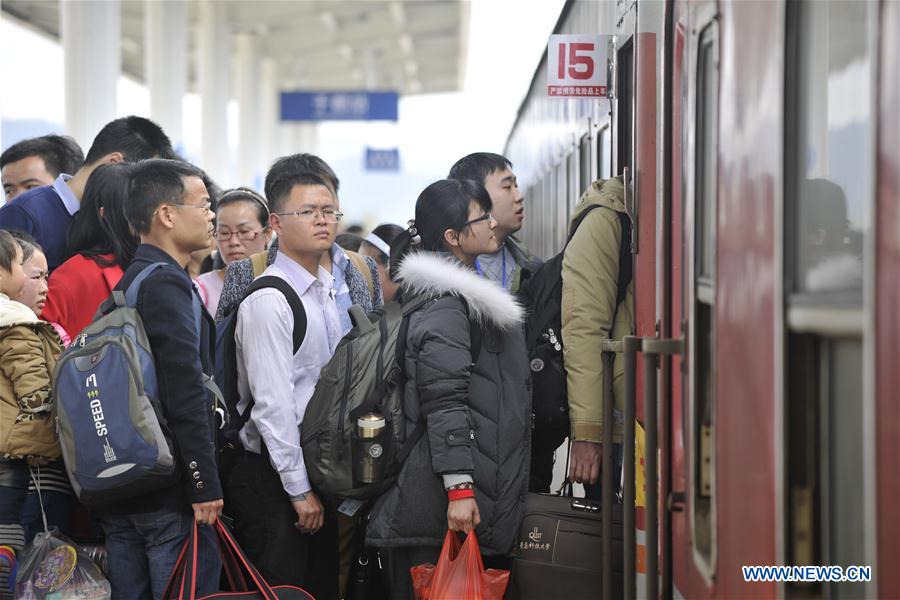


Passengers prepare to get on a train at the railway station of Yudu County, east China's Jiangxi Province, Feb. 12, 2016. Railway stations around the nation witnessed surging passenger flows on Friday as the Spring Festival came to the end and people started to return to school and work. (Xinhua/Wang Wei)
BEIJING, Feb. 13 -- The end of Spring Festival holiday often means bidding farewell to home and getting back to work at faraway cities. But for many Chinese, this year's holiday marks the beginning of a new life with a job at home.
"No matter how fantastic the outside world is, home is home and there is no place better than home," said Wu Longqing, 36, a villager in Liping County, southwest China's Guizhou Province.
Wu, who has been working in a factory of the eastern Zhejiang Province during the past ten years, decided to stay at home and open a small supermarket after this Spring Festival.
"I was forced to stay outside since I could see no opportunity at home. However, I saw big changes here recently," he said. "We now have cement roads linking each household. The village also has a new kindergarten and some public toilets are under construction."
During the past few weeks, Wu and his wife have been preparing for the opening of the store. They plan to apply for a business license after the New Year holiday.
The couple have a 13-year-old daughter and a seven-year-old son. The children have been left at home, looked after by Wu's 70 years old mother.
"We owe them too much. It is time for us to come back home to take care of them," Wu said.
Wu is not alone.
Hu Xing, 27, has been working in the southern Guangdong Province after graduating from high school. At the end of last year, he made up his mind to return home in Henan Province.
Hu and his family also opened a small supermarket in the town. "In the past, all my family members were working outside the village, but we all came back since the improved transportation and living situation in our hometown has offered us business opportunities."
"Though my income is lower than what I made working in Guangdong, staying with my family is much happier than drifting outside alone," he said.
During the past three decades, many rural people left hometown for employment in China's rapidly expanding cities, leaving elderly and children at the countryside.
The trend is being reversed in recent years, partially thanks to the shift of labor-intensive industries from urban to rural areas and the rise of rural entrepreneurship.
More than 1.72 million migrant workers have returned home at Chongqing Municipality since 2010.
The population of "left behind children", whose parents have left hometown for the work in the city, has been reduced by some 180,000 during the past three years in Chongqing, according to the municipal women's federation.
Primary school student Tao Xingyue said in the past she could only see her parents during holidays. She would get worried and upset when saying goodbye. "Now I can be with them every weekend since they are working in a factory not far away," she said.
Experts believe the homecoming rural people will bring development to the countryside and improve the livelihood of the rural children and elderly. However, more government support is called for.
Dang Guoying, researcher on rural development with the Chinese Academy of Social Sciences, said rural entrepreneurs face great challenges in terms of capital and skills and local governments should come up with more preferential policies to improve countryside entrepreneurial environment.
Day|Week

 China releases HD true color images of lunar surface
China releases HD true color images of lunar surface To-be flight attendants undergo training at snow-covered field
To-be flight attendants undergo training at snow-covered field Aerial photos taken on J-11 fighter
Aerial photos taken on J-11 fighter 'Coldest town in China' — a fairyland you don't want to miss
'Coldest town in China' — a fairyland you don't want to miss Deep love for breathtaking Hainan
Deep love for breathtaking Hainan Beautiful Chinese tennis player Wang Qiang goes viral online
Beautiful Chinese tennis player Wang Qiang goes viral online Minus 71 degrees! Coldest village on earth
Minus 71 degrees! Coldest village on earth Chinese pole dancing master opens class in Tianjin
Chinese pole dancing master opens class in Tianjin The most beautiful town of snow in China
The most beautiful town of snow in China SWAT members hold romantic wedding in E China
SWAT members hold romantic wedding in E China